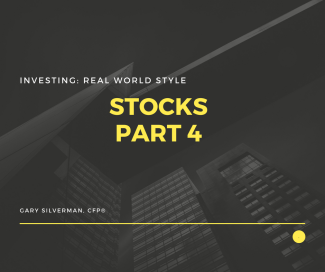
Investing with stocks: Part 4
By Gary Silverman, CFP®
In last week’s column, we made the following discoveries:
- You (or your spouse) may live a long time;
- You’ll need more money every year to live comfortably; and
- Not only will you need to earn more each year, but you must also be able to cover the taxes on what you earn so that you have enough left over to afford your cost of living.
But this is a discussion of stocks, so why do we care? After all, stocks can lose a lot of money. In late 2007 through early 2009, stock markets around the world lost more than 50% of their value. As we discussed before, that even wiped out a decade worth of stock gains. During the same time period, bonds, the likely alternative to stocks, returned a whole lot more.
But even though the stock market can be down for a decade, it’s never been down for two, let alone three. So if you are 40 and planning on retiring at 65, anything you put into your retirement savings has enough time to grow to get over pesky little things like the tech bubble burst, the credit crisis, or even the Great Depression.
If you are in your 70s, you may be around another 20 years. You also have a significant portion of your future needs best served by stocks, even if the markets tumble early on.
In your 80s? Well, you might have another 10 years to go. And while there are certainly 10 year periods where the stock market is down, the vast majority of times adding a modest amount of stocks to your predominantly bond and cash portfolio gives a much better return without measurably raising risk.
Let’s use longer-term averages where stocks return 10%, bonds 6% and cash 3%. If inflation is 3% you effectively earn nothing on your cash investments. Bonds would generate an inflation-adjusted return of 3% and stocks would gain you 7%. Earning more than double the inflation-adjusted rate of return is good for your portfolio. Add taxes to the equation, and stock returns are stellar compared to bonds. Plus they actually get taxed at a more favorable rate than bonds do.
My study has shown that stocks should be part of a well-constructed retirement portfolio. Obviously, you need to learn more before adding stocks to your retirement savings if you’re not doing so already. After all, you’ll be the one that has to live with the results, good or bad.
Oh, and one other problem. Even though it makes perfect sense that stocks should be part of your retirement investment—maybe even making up the majority of your holdings—you may not be able to hang on to them. In future columns, I’ll give you some things to think about that will give you a full picture of what it means to be involved with stocks.
This article was scheduled to be published in the Wichita Falls Times Record News on June 7, 2017.
Gary Silverman, CFP® is the founder of Personal Money Planning, LLC, a Wichita Falls retirement planning and investment management firm and author of Real World Investing.

